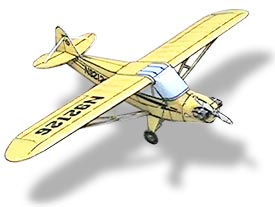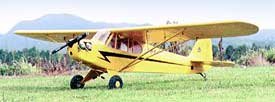
Finished model - wingspan 17.7cm.
The Legend
The Piper J-3 Cub, the best-known light plane of all time,
became the Model T of aviation. Built by the thousands for both civilian
and military use, the J-3 has been flying since prewar 1938. By December
1941, one-third of all the airplanes in America, and nearly two-thirds of
all the light planes, were Piper Cubs.

Instructions and pattern on one 8 1/2" x 11" sheet.
Download the"Cybermodel"
The download is an Adobe PDF file (510 K). This download is a courtesy of
Fiddler's Green.
Download PDF
file from source #1
Download PDF file from
source #2
Don't have Adobe Acrobat?
Download the latest version of the free Adobe
Acrobat Reader. The Adobe Acrobat reader allows you to download, view
and print PDF files. You must have Adobe Acrobat 4.0 or
higher installed on your computer to view and print this project.
Printing
Use an ink-jet printer or laser printer. Print the PDF file on ledger paper
or light card stock. After printing you may notice that the ink has saturated
the paper where there are solid colors. You can set your printer on medium
quality and try again. This causes the printer to use less ink. Wait for
the paper dry before starting your project.

Model shown in simulated flight.
Top of next column |

Details of the finished model.
You will be proud to display this highly detailed, easy to build paper
model.
Interesting tidbits
about this historic airplane.

A REAL Piper J-3 Cub
Buying a real Piper Cub
The model that's still considered the generic general aviation airplane
by many non-pilots still has an enormous attraction to pilots, as well.
In fact, it's so popular, it has taken on classic status and assumed a price
tag out of all proportion to its talents. Today, sharp J-3s start at around
$20,000 and, if you must have a show-stopper, expect to pay $30,000 or more.
Cub downs Messerschmitt Bf-109
During World War II, some Piper Cubs were equipped with rockets. One even
was credited with downing a Messerschmitt Bf-109 that was chasing the Cub
which could turn on a dime and the German couldn't. In spite of wartime
heroics, the 'Cub' will always be remembered as the airplane that gave wings
to thousands of pilots all over the world.
Newfangled contraption
A Cub brings a message to Major General Innes P. Swift, commander of the
U. S. 1st Cavalry Brigade. Apparently the old warrior could understand horses
and even tanks in a pinch, but what the hell, he thought, is the U. S. Army
doing messing around with airplanes, and pretty flimsy-looking ones at that?
So to the pilot he growled: "You looked just like a damn grasshopper
when you landed that thing out there in those boondocks."
"Grasshoppers" they remained to him from then on, and eventually
the U. S. Army capitulated and called them Grasshoppers, too.
Important passengers
World War II brought new orders for the J-3. painted in olive drab and redesigned
the L-4, for the army artillery spotting and liaison. Besides that workhorse
task, the L-4s served as transports for Generals Eisenhower, Patton, Bradley,
Clark and others. They landed on beachheads and back roads, in pastures
and plowed fields, and gave the ground forces a degree of communication
they never had before. |

